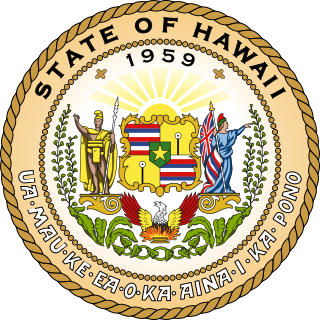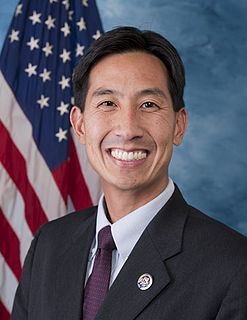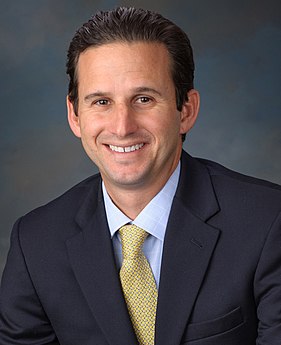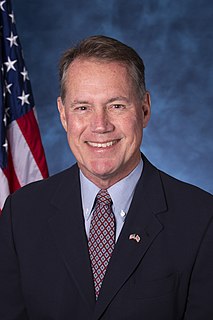
These are tables of congressional delegations from Hawaii to the United States Senate and United States House of Representatives.

Muliufi Francis Hannemann is an American politician, businessman, and non-profit executive. He was elected twice as Mayor of Honolulu in 2004 and 2008. Hannemann has served as a special assistant in Washington, D.C., with the Department of the Interior, where he was selected for a White House fellowship in the Reagan administration under Vice President George H. W. Bush. He also served as chairman of the Honolulu City Council. He is the first person of Samoan descent and the second member of The Church of Jesus Christ of Latter-day Saints to serve as Mayor of Honolulu.

Brian Emanuel Schatz is an American politician serving as the senior United States Senator from Hawaii since 2012. Schatz was appointed by Governor Neil Abercrombie to replace Senator Daniel Inouye after his death.

This only covers the history of the politics of the State of Hawaii. For information on the political history of the previous two forms of government, see Territory of Hawaii - Organic Act and Kingdom of Hawaii - Government. The politics the U.S. state of Hawaii take place within the framework of a Democrat-dominated government.

The 2010 congressional elections in Hawaii was held on November 4, 2010 to determine who was to represent the state of Hawaii in the United States House of Representatives for the 112th Congress from January 2011, until their terms of office expire in January 2013.

The 2010 special election for the 1st congressional district of Hawaii was a special election to the United States House of Representatives that took place to fill the vacancy caused by Representative Neil Abercrombie's resignation on February 28, 2010 to focus on his campaign for Governor of Hawaii in the 2010 gubernatorial election. Abercrombie planned to not run for re-election in 2010, and many of the candidates that were running for his open seat transferred to the special election. The election was held on May 22, 2010 and Republican Charles Djou won, defeating five Democrats, four fellow Republicans, and four Independent candidates. The main reason for his win was because there were two Democratic candidates instead of one, which split the votes, allowing Djou to win, as Hawaii is an overwhelmingly Democratic state. As of 2019, this is the last time in which a Republican was elected to congress from Hawaii. Djou became the first Republican elected to Congress from Hawaii since Pat Saiki in 1988; Djou volunteered on Saiki's 1988 campaign, and Saiki served as Djou's campaign chair in 2010.

The 2006 congressional elections in Hawaii were held on November 4, 2006 to determine who was to represent the state of Hawaii in the United States House of Representatives for the 111th Congress. Hawaii has two seats in the House, apportioned according to the 2000 United States Census. Representatives are elected for two-year terms.

The 2012 United States Senate election in Hawaii took place on November 6, 2012, concurrently with the 2012 U.S. presidential election as well as other elections to the United States Senate and House of Representatives and various state and local elections. Incumbent Democratic U.S. Senator Daniel Akaka decided to retire instead of running for re-election to a fourth term. Democratic Congresswoman Mazie Hirono defeated former Hawaii Governor Linda Lingle in a rematch of the 2002 Hawaii gubernatorial election.

The 2012 United States House of Representatives elections in Hawaii were held on Tuesday, November 6, 2012 to elect the two U.S. Representatives from the state, one from each of the state's two congressional districts. The elections coincided with the elections of other federal and state offices, including a quadrennial presidential election and an election for the United States Senate. Primary elections were held on August 11, 2012.

The 2014 Hawaii gubernatorial election took place on November 4, 2014, to elect the Governor of Hawaii, concurrently with a special election to Hawaii's Class III Senate Seat, as well as other elections to the United States Senate in other states and elections to the United States House of Representatives and various state and local elections.

The 2016 United States Senate election in Hawaii was held November 8, 2016, concurrently with the 2016 U.S. presidential election as well as other elections to the United States Senate and House of Representatives and various state and local elections. The primaries were held August 13.

The 2014 United States Senate election in Hawaii took place on November 4, 2014, the general Election Day in the United States, concurrently with other elections to the United States Senate in other states as well as elections to the United States House of Representatives and various state and local elections.

The 2014 United States House of Representatives elections in Hawaii were held on Tuesday, November 4, 2014 to elect the two U.S. Representatives from the state of Hawaii, one from each of the state's two congressional districts. The elections coincided with the elections of other federal and state offices, including an election for Governor of Hawaii and a special election to the United States Senate.

The 2018 United States Senate election in Hawaii took place on November 6, 2018. Incumbent Democratic U.S. Senator Mazie Hirono is running for reelection to a second term. Hirono ran unopposed in her party's primary and was easily reelected defeating Republican challenger Ron Curtis.

The 2016 Honolulu mayoral election determined the Mayor of the City and County of Honolulu for the full term commencing in January 2017. As in the previous several elections, the Honolulu metro and its cost overruns was a major topic of the campaign.
















